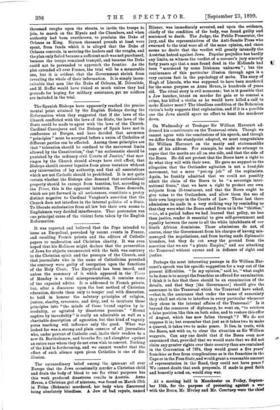On Wednesday at Tredegar Sir William Harcourt ad- dressed his
constituents on the Transvaal crisis. Though we cannot agree with the conclusions of his speech, and though we differ from the standpoint adopted, we must congratulate Sir William Harcourt on the manly and statesmanlike tone of his address. For example, he made no attempt to argue that the merits are all on one side, and that the side of the Boers. He did not protest that the Boers have a right to do what they will with their own. He gave no support to the allegation that the Outlander agitation is not a bond-fide movement, but a mere "put-up job" of the capitalists. Again, he frankly admitted that we could not possibly admit the claim of the Boers to be " a sovereign inter- national State," that we have a right to protect our own subjects from ill-treatment, and that the Boers ought to give votes to the Outlanders, and allow them the use of their own language in the Courts of Law. These last three admissions he made in a very striking way by reminding us that they were what the Boers asked from us in the "thirties," —i.e., at a period before we had. learned that policy, no less than justice, render it essential to give self-government and equality between the races to all the white inhabitants of our South African dominions. These admissions do not, of course, clear the Government from his charges of having mis- managed the negotiations, and from having made diplomatic blunders, but they do cut away the ground from the assertion that we are "a pirate Empire," and are attacking the Transvaal without excuse and in defiance of right and justice.


































 Previous page
Previous page